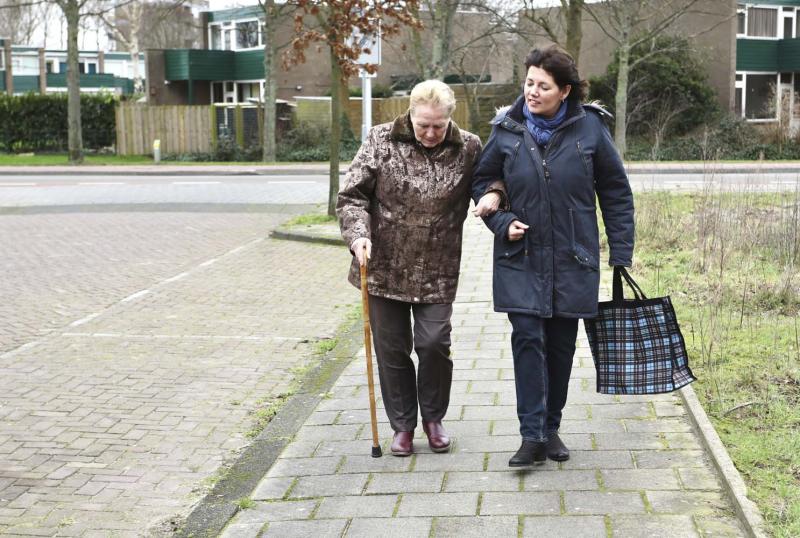Key points
- Diverse interdisciplinary teams that carry out standardised assessments and goal setting to direct treatment can improve the daily functioning of older people.
- Reablement is generally well received by older people and their informal carers, however, those who do not understand their role in reablement or how services relate to achieving their goals are often poorly engaged.
- Involving older people in the process of goal setting to ensure tasks are meaningful has the potential to improve health related quality of life for individuals living in long-term care.
Goal setting is a crucial component of rehabilitation, reablement and restorative aged care. Each person accessing aged care services brings a diverse range of physical and psychological needs. It is therefore important to get to know each older person as a unique individual to gain an understanding of their specific needs and ambitions. Goal setting is a method used to identify and negotiate goals to direct treatment and therapeutic support. Goals may include improving function to be able to live independently, or return to social activities. [1] Goal setting should provide an opportunity for shared decision-making between older people who are at the centre of these decisions, and their carers. [2] Goals that are meaningful to an individual often act to motivate them to participate in rehabilitation, achieve their goals and improve self-efficacy. [3, 4] Reablement often uses a goal directed approach to specifically help older people regain their independence. [5] This approach is commonly integrated into aged care services.
This evidence theme is a summary of one of the key topics identified by a scoping review of rehabilitation, reablement, and restorative care research. If you need more specific or comprehensive information on this topic, try using the PubMed search below.
We found eight reviews [6-13] that reported goal setting in the context of delivering rehabilitation, reablement and restorative care in aged care. These reviews identified that:
- Reablement is generally well received by older people and their informal carers, however, those who didn’t understand their role in reablement or how the services related to achieving their goals demonstrated poor engagement. [9]
- Hip fracture patients were aware that their recovery was dependent on their commitment to personal goals. [7]
- Interventions used to support home-based exercise for older people living at home following a hip fracture often didn’t meet their abilities or goals. [8]
- Diverse interdisciplinary teams carrying out standardised assessments and goal-setting to direct interventions (including, Activities of Daily Living training, physical and/or functional exercise, education, management) improved daily functioning of older people. [6]
- Transition interventions providing education and goal-oriented interventions were effective in improving health and well-being outcomes for older adults at home. [10]
- Involving each individual in the process of goal setting has the potential to improve health related quality of life (HRQoL) for older people living in long-term care. [11]
- An individual can ensure that the older person/people they care for are involved in decision making and goal setting. This will support them to achieve their ambitions and continue to lead a meaningful life.
- Aged care staff can have open discussions with care recipients and service providers about the importance of goal setting and refer to allied health professionals for support.
- Provide training to care staff to ensure that they can collaborate with older people to help the older person set and achieve meaningful goals.
- Consider the importance of goal setting and integration into service delivery with particular focus on rehabilitation, reablement and restorative care to improve an older person's sense of worth and quality of life.
- Levack WMM, Siegert RJ. Challenges in theory, practice and evidence. In: Siegert RJ, Levack WMM, editors. Rehabilitation goal setting: Theory, practice and evidence. Boca Raton: CRC Press; 2015. p. 3-19.
- Bachmann S, Finger C, Huss A, Egger M, Stuck AE, Clough-Gorr KM. Inpatient rehabilitation specifically designed for geriatric patients: Systematic review and meta-analysis of randomised controlled trials. BMJ: 340(7758), 1230-1230.
- Levack WM, Weatherall M, Hay-Smith EJC, Dean SG, McPherson K, Siegert RJ, Levack WM. Goal setting and strategies to enhance goal pursuit in adult rehabilitation: Summary of a Cochrane systematic review and meta-analysis. Eur J Phys Rehabil Med. 2015;52(3):400-416.
- Baker N, Lawn S, Gordon SJ, George S. Older adults’ experiences of goals in health: A systematic review and metasynthesis. J Appl Gerontol. 2021;40(8):818-827.
- Maxwell H, Bramble M, Prior SJ, Heath A, Reeves NS, Marlow A, Campbell S, Doherty DJ. Staff experiences of a reablement approach to care for older people in a regional Australian community: A qualitative study. Health Soc Care Community. 2021;29(3):685-693.
- Buma LE, Vluggen S, Zwakhalen S, Kempen GIJM & Metzelthin SF. Effects on clients' daily functioning and common features of reablement interventions: A systematic literature review. Eur J Ageing. 2022; 19(4), 903-929.
- Abrahamsen C, Norgaard B. Elderly patients' perspectives on treatment, care and rehabilitation after hip fracture: A qualitative systematic review. Int J Orthop Trauma Nurs. 2021;41:100811.
- Kuijlaars IAR, Sweerts L, Nijhuis-van der Sanden MWG, van Balen R, Staal JB, van Meeteren NLU, Hoogeboom TJ. Effectiveness of supervised home-based exercise therapy compared to a control intervention on functions, activities, and participation in older patients after hip fracture: A systematic review and meta-analysis. Arch Phys Med Rehabil. 2019;100(1):101-101.
- Mulquiny L, Oakman J. Exploring the experience of reablement: A systematic review and qualitative evidence synthesis of older people's and carers' views. Health Soc Care Community. 2022; 30(5), e1471-e1483.
- O’Donnell R, Savaglio M, Skouteris H, Banaszak-Holl J, Moranl C, Morris H, Vicary D, Ayton D. The effectiveness of transition interventions to support older patients from hospital to home: A systematic scoping review. J Appl Gerontol. 2021; 40(11), 1628-1636.
- Tessier A, Beaulieu MD, McGinn CA, Latulippe R. Effectiveness of reablement: A systematic review. Healthc Policy. 2016;11(4):49-59.
- Whitehead PJ, Worthington EJ, Parry RH, Walker MF, Drummond AE. Interventions to reduce dependency in personal activities of daily living in community dwelling adults who use homecare services: A systematic review. Clin Rehabil. 2015;29(11):1064-1076.
- Murray J, Hardicre N, Birks Y, O'Hara J, Lawton R. How older people enact care involvement during transition from hospital to home: A systematic review and model. Health Expect. 2019;22(5):883-893.
Connect to PubMed evidence
This PubMed topic search is limited to home care and residential aged care settings. You can choose to view all citations or citations to articles available free of charge.


